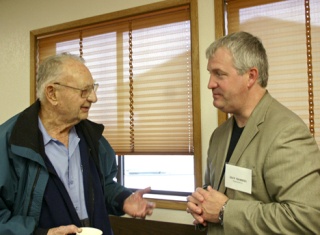Rep. Jeff Morris, D-Anacortes, won a seventh term Tuesday as the San Juan Island’s representative in the state House.
At 8:59 p.m., Morris received 11,630 votes to Howard Pellett’s 3,206. Pellett is the Green Party’s candidate and a former Bothell city councilman now living in Anacortes.
Morris received 5,194 votes in San Juan County to Pellett’s 1,606, and 6,436 votes in Whatcom County to Pellett’s 1,600. The Secretary of State’s office was still waiting for results from Skagit County.
State representatives serve two-year terms and receive $42,106 a year.
Morris was elected speaker pro tem by his colleagues last year. He is chairman of the House Committee on Technology, Energy, and Communications. He also serves on the House Appropriations Subcommittee on General Government & Audit Review, and chaired the task force to keep Boeing 7e7 manufacturing in Washington state.
Morris is chairman of the Council of State Governments, West. When he’s not on legislative business, he is director of the Northwest Energy Technology Collaborative, which works to promote growth of the energy-technology industry in the region.
Two big issues facing the post-election Legislature: funding for education and ferries.
In April, Morris and fellow 40th District Rep. Dave Quall, who was unopposed for reelection, irked islanders when they suggested that residents sue the Legislature to guarantee adequate funding for education. San Juan Island public schools were facing a $650,000 deficit caused by an enrollment decline and inadequate state funding for a voter-mandated cost-of-living increase for teachers.
“When I’m asked that question, ‘Should you sue us?,’ I have to say, ‘Yes, you need to sue us,'” Morris said at the meeting. “It’s very very difficult to get 51 of us in the House to line up and make a definitive statement about what basic education should be, or what an appropriate level of funding is.”
Following the meeting, Morris expressed his frustration with House budget proposals for education being struck down by the Senate or the governor’s office. He also said legislative funding priorities get upended by citizen initiatives.
“The citizens passed the salary thing we’ve been trying to live up to five years ago. At a certain point, it becomes a sand pit you can’t quite climb out of … One of the problems in our initiative system, quite honestly, is that we don’t make people show how they’re going to pay for what they want to do.”
As a source of funding for transportation, Morris is exploring the feasibility of a tax on a vehicle’s mileage for the year. Such a tax would reflect a vehicle’s road usage and would replace the old motor vehicle excise tax, which was a major source of funding for state ferries until it was abolished by voters and the Legislature in 1999.
In a questionnaire he filled out for VoteSmart.org, Pellett supported same-sex marriage; supported greatly increasing funding for education, emergency preparedness, environment and health care; and “slightly” decreasing funding for transportation and highway infrastructure.
Pellett also supports increasing taxes on alcohol, cigarette and gasoline. “We need to look to a progressive income tax to raise necessary funds to adequately run state government and to a shift from a war economy to a peace economy,” he said.
— With reporting by Richard Walker




